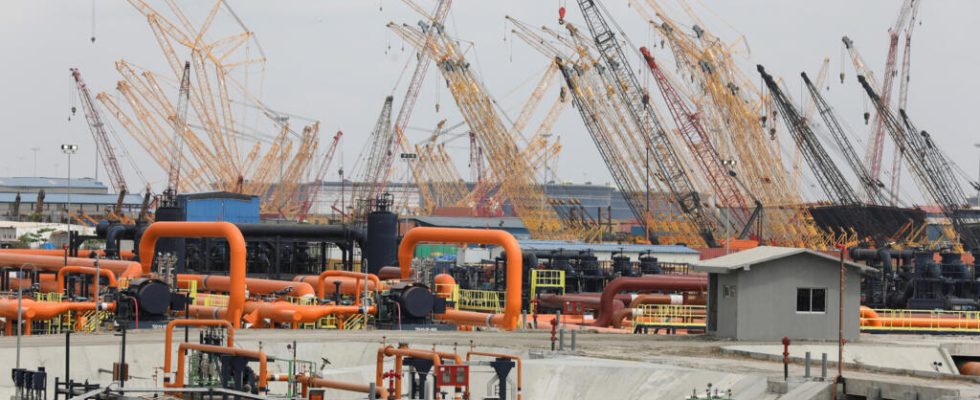Nigeria, the continent’s leading crude oil producer, currently imports almost all of its fuel. But the rehabilitation of four public refineries as well as the commissioning of billionaire Aliko Dangote’s mega-project in Lagos could completely change the situation.
4 mins
At Nigeria, six million barrels of crude oil have been delivered in recent weeks to the port of Lekki to supply the first operations of the Dangote group’s mega-refinery. This is an essential step, more than six months later the official inauguration of this titanic projectcosted at 20 billion dollars – and whose delivery was seriously delayed.
In a press release, the group Dangote announced “ the start of production » of diesel and fuel oil for the aviation sector. But we will still have to wait before fuel production begins. “ Let’s say this is the first time they’ve put oil in the system and run raw product through the cogs. It mainly involves testing the equipment one by one to check if it works. », confides a good connoisseur of the Nigerian oil sector.
The specialists all speak of the technical complexity of commissioning the largest single-train refinery in the world, the operation of which requires a substantial and sustained supply of crude oil. “ They will not be able to last more than a few weeks with this first delivery. Except that such machinery uses a lot of energy and costs a fortune to run.continues the same source in Lagos. If it is shut down again after the testing phase, it will still take months to restart production “.
The supply challenge
The question of crude oil supply is central to ensuring the continuity of refined product production. Nigeria’s national oil company, NNPC, which is a 20% shareholder in the project, had committed to supplying some 300,000 barrels of crude per day, but this will be insufficient to bring production to its maximum of 650,000 barrels. per day. “ To achieve this production capacity, it will be necessary to ensure that 20 to 30 cargoes of crude oil are delivered very regularly to Lekki.insists Charles Thiémélé, Africa director of BGN. It is a technical challenge, especially since significant storage capacities are required for the refinery to operate without interruption. “.
Ultimately, it is therefore likely that the Dangote refinery will have to obtain its supplies from outside Nigeria. “ There is always crude available on the market, as long as you can afford it », assures this trader, who also says he is confident about the commercial opportunities for the refined oil which will leave the Lekki factory.
However, fuel produced in Lagos is unlikely to be distributed exclusively to the Nigerian market. As a commercial enterprise, the Dangote Group should go first to the highest bidder. “ Even if it chooses to sell in the sub-region, the impact of the project will undoubtedly be beneficial for the Naira [la monnaie nationale, dont la valeur n’a cessé de dégringoler ces derniers mois, NDLR] », However, notes the good connoisseur of the Nigerian oil sector.
Rehabilitation of public refineries
Beyond the private project led by billionaire Aliko Dangote, Nigeria is also counting on the rehabilitation of its public refineries to ensure its gasoline supply in the coming years: 1.5 billion dollars have been allocated in 2021 for the renovation of the Port Harcourt refinery, built by the Italian company Maire Tecnimont. It will soon be ready to begin operations after an initial test phase. The Kaduna and Warri refineries, which are smaller in size, benefit from a “ quick-fix », a rapid repair aimed at relaunching production without massive investment.
The NNPC has already indicated that it would entrust the management of the Port Harcourt refinery to private operators in order to “ guarantee energy security » from Nigeria. “ The sustainability of these repairs will really depend on the level of investment allocated to the maintenance of these three refineriespoints out Mickael Vogel, research director for the Hawilti firm in Lagos. Namely that together they represent more than 400,000 barrels per day – enough to meet local demand. Their optimal functioning is therefore in the interest of Nigeria, even if it will take months “.
The issue is no less crucial. “ If Nigeria manages to renovate its public refineries – which should be done by 2024 – 2025 – and the private Dangote factory produces as much as planned, the country will become the largest refiner in Africa, ahead of the Algeria, ahead of Egypt, ahead of South Africadevelops the analyst. This should notably allow Nigeria to save its dollar reserves, to spend them elsewhere than on the purchase of gasoline. With the prospect of re-stabilizing the finances of Africa’s largest economy “.
Read alsoTotalEnergies ready to invest six billion dollars in Nigeria
